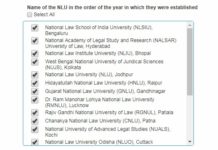Hello,
A lot of us make lists; for a lot of things. In a manner of speaking, we would like to define them, to feel that we are, somehow making a commitment. At CLATGyan, love our lists, we make one each year when the panic reaches its peak (boards+CLAT prep, heard of this combo before?).  Anyway, I am a strong believer in the idea that lists work wonderfully for people preparing for CLAT, especially because, for once, someone’s precise and telling you what to do. So, here goes:
Anyway, I am a strong believer in the idea that lists work wonderfully for people preparing for CLAT, especially because, for once, someone’s precise and telling you what to do. So, here goes:
1. Organize your preparation. Do not attempt to go all over the place; instead, be honest to yourself. Figure out which subject you’re absolutely terrible in and give it the most amount of time you can afford.
2. Do not ignore others. If your strength is a certain subject, you can afford to ignore it in the short run, but do stay in touch with it. If it’s Math that you’re just wonderful in, then leave it for sometime, but solve a question or two whenever you feel you haven’t practiced it in sometime
3. Cut it slim, post-January isn’t the time for you to be doing the kind of detailed preparation that you ideally should have been doing. Simplify all your preparation to practice – gear yourself towards strengthening your basics and just stick to working on getting as much practice as possible.
4. When I used to prepare for CLAT, one rhetorical, contemptuous advice that everyone loved giving me was on the importance of practice. If you didn’t practice, you were “basically a sux”. And now I know why; there is simply no substitute to practice: advantages are pretty evident. First and foremost, it helps you in your speed (and a lot of you seem to whine about it a lot). Second, it makes you comfortable in a variety of questions; no question should be a “surprise” question, no question should be “out of syllabus” (another thing a lot of you seem to whine about). Practice, it’ll make you more confident, it’ll also tell you where you are going wrong. There is no substitute to doing a good Test Series or a set of NLS/NALSAR/CLAT past year papers.
5. No one, NO ONE asked you to stop reading the newspaper. Read the newspaper everyday. Make sure you have covered the Holy Trinity of GK Preparation: Newspaper, our Compendiums/Daily Briefs and Pratiyogita Darpans. To feel a little more comfortable, solve a few questions from time to time and read up on the excellent The Hindu Diary of Events that you will find at your doorstep at the end of the year, if and only if you are a subscriber of The Hindu.
6. Please don’t flatter yourself. No one can attend a zillion different “social events”, text simultaneously, Facebook/tweet/tumble(?), wear those hideous Aam Aadmi caps – and STILL – think they’ll manage to find time or the energy to study. Trust me, every minute counts. And so, don’t be complacent; instead attempt to enjoy what you are doing, and make it seem like a challenge, make it interesting. Make all the preparation that you’re going through to some practical use. Debate GK issues with a friend, read difficult passages somewhere and try to comprehend them properly, etc. (you could also allot rooms to 6 students who have so many preferences that you need to make a table to “solve” it :/)
7. Speaking of time; use it creatively. Every moment that you are doing something can be weaved into your CLAT prep. So, when you are travelling to your tuition or school, finish reading the newspaper there. Solve the questions in Pratiyogita Darpan while in the bus. Quiz your friend (or ask her to quiz you) on the week’s events, etc.
8. One problem that seems to be a recurring event is the Legal Reasoning section. And reams of papers have been wasted on advising you what to do. It’s simple: Don’t think. For once, all you have to do is be obedient and follow what the principle says.
9. As for time management during the tests; the best way is to practice. The second best way is to prioritize. Always start with the section that has the chances of getting you the most number of marks in the least amount of time. Also, always, make up tricks to deal with questions faster. For instance, dealing with Reading Comprehensions is far easier once read the questions first and then read the paragraph. You effectively know what you are looking for.
And now, some traditional CG pep talk: The first time I’d read about NALSAR was when I was in 11th. And an India Today issue surveyed Indian universities. It had a picture of a few Nalsarites sitting around the Keerthi Stambh and discussing something deep. And as impressionable as I was then, I took Nalsar to be my dream university. Somehow, the idea of just sitting around and learning so much seemed to resonate with some deep, lazy, arm-chair commentator part of me. Nalsar, for the next two years, became the place where uncomfortable questions would be asked, where the assumption would be that each argument was made with a conscious, dedicated effort to simply learn. And I made it to NALSAR. Half of it had something to do with just knowing that I’m going to be learning things that would disrupt the privilege that my middle-class upbringing gave me, the other half of it was how much joy there is to do what you genuinely like doing.
Hopefully, you will make it to Shamirpet or Nagarbhavi. 🙂
















Thanks a lot…it is really helpful..
Thank you soo much!
Thank you sir
Thank you. Keep up the good work, CG!
If I start preparing from November then can I clear clat but I have done some basic like you say 30℅ main study I will start now
I love this post. It can’t be more relevant
Thanks Sir!